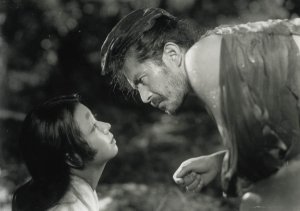Rashomon
The husband, the wife... or the bandit?

|
When Marge Simpson tries to convince Homer that he'll enjoy the family trip to Japan, based off his enjoyment of Rashomon, he unwittingly responds, "that's not how I remember it". This off-hand joke not only encapsulates the subjective philosophy and concerns of Akira Kurosawa's Rashomon but also nods towards the film's ubiquity and massive influence on popular culture, as its resonance can be seen in so many modern films and television series.
The film's basic narrative concerns a rape and murder set in 16th century Japan, but Rashomon is less interested in any sort of objective story than the subjective retellings of the characters involved. Each version contradicts the others, and ultimately the film leaves us with a sense of the impossibility of an objective truth, even if the final telling is portrayed as somewhat more genuine than the previous are.
Rashomon sometimes feels more novelistic than explicitly cinematic, with its focus on storytelling and overtly philosophical concerns, and indeed was adapted from a pair of short stories. Yet Kurosawa's talent means that the film is both entertaining and intelligent, exploring complex ideas while continuing to keep the audience's attention. Kurosawa regular Toshiro Mifune appears as the criminal bandit, his acting as delightful and unrestrained as always. There are also injections of comedy, from the squabbling characters who retell the film to the audience (another layer of subjectivity), to the darkly humorous utilisation of the murder victim's spirit as another of the storytellers. Winner of the Golden Lion at the Venice Film Festival upon release, Rashomon has proven to be one of the most interesting and influential films ever made.
Elliot Tume
More Information | Back to Previous Schedule | This Season | BBFC Classification Guidelines
Screenings of this film:
| 1977/1978 Spring Term – (35mm) |
| 1985/1986 Autumn Term – (35mm) |
| 2010/2011 Spring Term – (35mm) |


